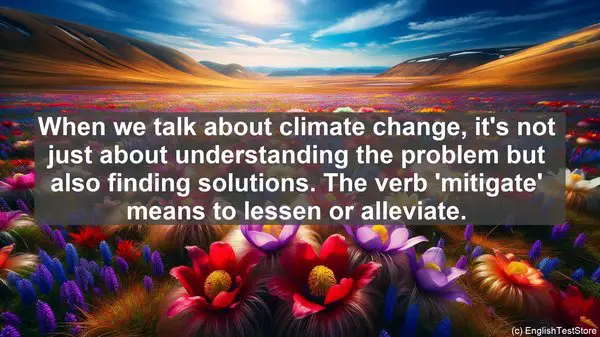Introduction: The Importance of Vocabulary
When it comes to discussing climate change and environmental issues, having a strong vocabulary is crucial. It allows you to articulate your thoughts, convey your concerns, and engage in meaningful conversations. In this lesson, we’ll focus on 10 verbs that will serve as powerful tools in your environmental discourse.
1. Impact: Understanding the Consequences
The verb ‘impact’ is frequently used to describe the effect that human activities have on the environment. It signifies that our actions, whether positive or negative, can cause significant changes. For instance, you can say, ‘Deforestation impacts biodiversity, leading to the loss of numerous species.’

2. Mitigate: Taking Action to Reduce
When we talk about climate change, it’s not just about understanding the problem but also finding solutions. The verb ‘mitigate’ means to lessen or alleviate. It implies taking active steps to reduce the impact. For example, ‘To mitigate global warming, countries are adopting renewable energy sources.’
3. Advocate: Speaking Up for Change
To bring about significant transformations, it’s essential to have advocates. The verb ‘advocate’ means to publicly support or promote a particular cause. You can say, ‘Many young activists advocate for stricter regulations on carbon emissions.’
4. Adapt: Adjusting to New Conditions
As the climate changes, it’s crucial for both individuals and communities to adapt. The verb ‘adapt’ signifies adjusting to new circumstances. For instance, ‘Coastal cities are implementing measures to adapt to rising sea levels.’
5. Preserve: Protecting for Future Generations
Preservation is key to maintaining the planet’s resources. The verb ‘preserve’ means to protect or conserve. You can say, ‘Efforts are being made to preserve endangered habitats, such as rainforests.’
6. Promote: Encouraging Positive Actions
To create a sustainable future, it’s important to promote environmentally friendly practices. The verb ‘promote’ signifies actively encouraging or supporting. For example, ‘Schools often promote recycling programs to reduce waste.’
7. Monitor: Keeping a Watchful Eye
To ensure the effectiveness of environmental initiatives, monitoring is necessary. The verb ‘monitor’ means to observe or keep track of. You can say, ‘Scientists continuously monitor the ozone layer for any signs of depletion.’
8. Conserve: Using Wisely
Conservation involves using resources judiciously. The verb ‘conserve’ signifies the careful and sustainable use of something. For instance, ‘To conserve water, many households have installed low-flow faucets.’

9. Collaborate: Working Together for Solutions
Addressing climate change requires collective efforts. The verb ‘collaborate’ means to work together. You can say, ‘Countries need to collaborate on climate policies to achieve substantial results.’
10. Educate: Spreading Awareness
Lastly, spreading awareness is crucial for building a more environmentally conscious society. The verb ‘educate’ signifies imparting knowledge or information. For example, ‘Documentaries play a vital role in educating the public about environmental issues.’
